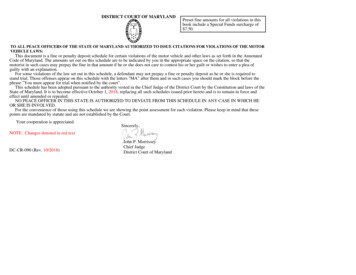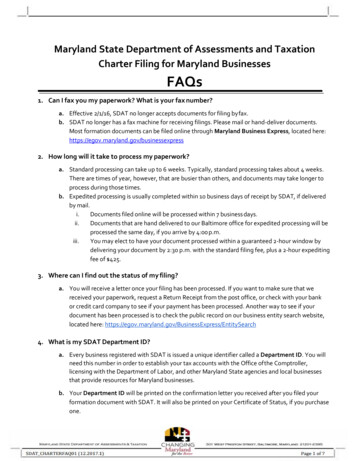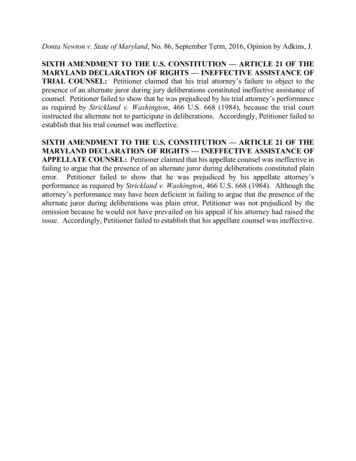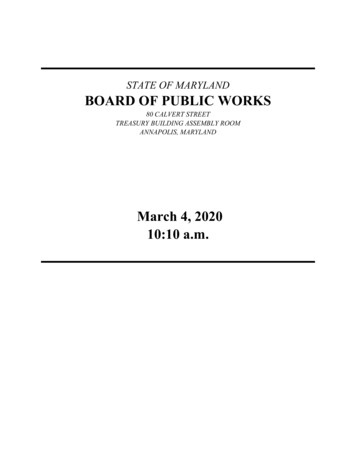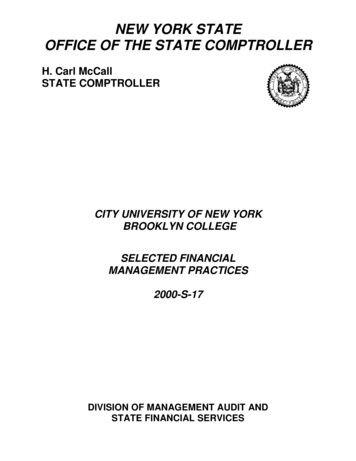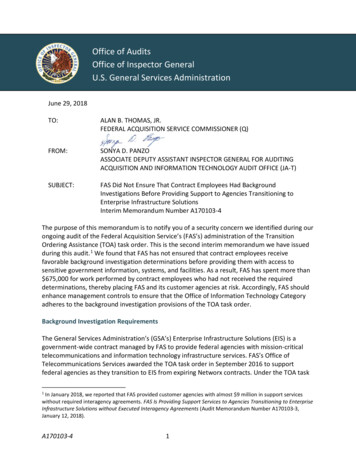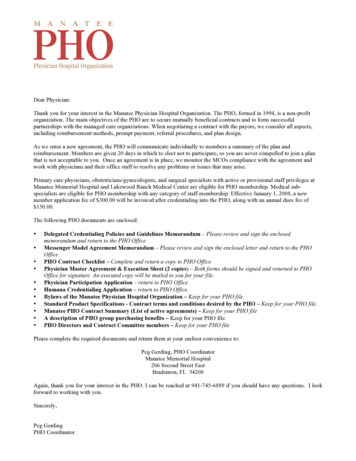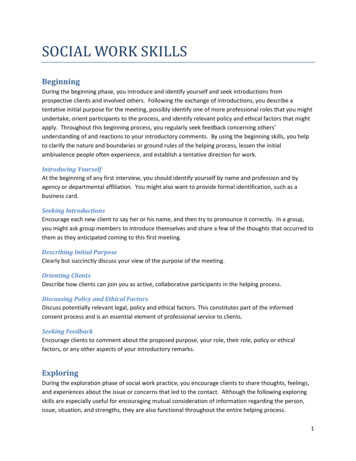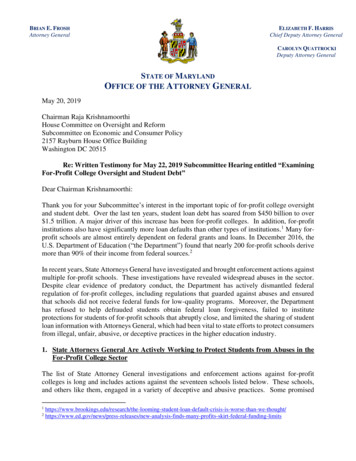
Transcription
BRIAN E. FROSHAttorney GeneralELIZABETH F. HARRISChief Deputy Attorney GeneralCAROLYN QUATTROCKIDeputy Attorney GeneralSTATE OF MARYLANDOFFICE OF THE ATTORNEY GENERALMay 20, 2019Chairman Raja KrishnamoorthiHouse Committee on Oversight and ReformSubcommittee on Economic and Consumer Policy2157 Rayburn House Office BuildingWashington DC 20515Re: Written Testimony for May 22, 2019 Subcommittee Hearing entitled “ExaminingFor-Profit College Oversight and Student Debt”Dear Chairman Krishnamoorthi:Thank you for your Subcommittee’s interest in the important topic of for-profit college oversightand student debt. Over the last ten years, student loan debt has soared from 450 billion to over 1.5 trillion. A major driver of this increase has been for-profit colleges. In addition, for-profitinstitutions also have significantly more loan defaults than other types of institutions.1 Many forprofit schools are almost entirely dependent on federal grants and loans. In December 2016, theU.S. Department of Education (“the Department”) found that nearly 200 for-profit schools derivemore than 90% of their income from federal sources.2In recent years, State Attorneys General have investigated and brought enforcement actions againstmultiple for-profit schools. These investigations have revealed widespread abuses in the sector.Despite clear evidence of predatory conduct, the Department has actively dismantled federalregulation of for-profit colleges, including regulations that guarded against abuses and ensuredthat schools did not receive federal funds for low-quality programs. Moreover, the Departmenthas refused to help defrauded students obtain federal loan forgiveness, failed to instituteprotections for students of for-profit schools that abruptly close, and limited the sharing of studentloan information with Attorneys General, which had been vital to state efforts to protect consumersfrom illegal, unfair, abusive, or deceptive practices in the higher education industry.1. State Attorneys General Are Actively Working to Protect Students from Abuses in theFor-Profit College SectorThe list of State Attorney General investigations and enforcement actions against for-profitcolleges is long and includes actions against the seventeen schools listed below. These schools,and others like them, engaged in a variety of deceptive and abusive practices. Some ng-limits
May 20, 2019Page 2prospective students jobs, careers, and further opportunities in education that the schools could notprovide. Many schools inflated job placement numbers and/or promised career services resourcesthat did not exist. Many nationally-accredited schools promised that their credits would transfer,even though credits from nationally-accredited schools often do not transfer to more rigorousregionally-accredited schools. Many students were placed in loans that the schools knew fromexperience their graduates could not pay back. The schools were overseen by accreditors whofailed to take action to protect students or the taxpayers who funded their federal student loans,despite ample evidence of these and other problems. In short, the entire for-profit education systemwas failing students and taxpayers.a) Career Education Corporation – Forty-nine Attorneys General settled in January 2019after an investigation revealed that the school deceived students about the total cost,transferability of credits, potential to get the necessary license for certain jobs, and thenumber of students who got jobs in their field of study. The school agreed to provide 493.7 million in nationwide debt relief and to make substantial reforms to itsrecruiting and enrollment practices. New York brought a separate case that was settledfor 10.25 million in 2013 for misrepresentations related to inflated job placementrates.3b) Dream Center Educational Holdings, LLC (“DCEH”) (operator of the Art Institute,Argosy University, and South University) – In March 2019, DCEH announced that itwas immediately closing all Argosy University campuses and many of its SouthUniversity and Art Institute campuses, disrupting the education of thousands ofstudents. Prior to the closure, Attorneys General discovered, and the school lateradmitted, that it deceived students and prospective students about the loss ofaccreditation by its Illinois Institute of Art and Art Institute of Colorado campuses,resulting in students paying for worthless credits. Attorneys General were also someof the first to learn and raise awareness about DCEH’s misappropriation of 13 milliondollars of federal student loan money and veterans’ benefits that the school should havedistributed to students. State Attorneys General are negotiating with the school tocreate a corrective action plan to remedy the accreditation misrepresentations and haveplayed an integral role in providing direct, timely outreach to former Argosy students,via both email and regular mail, regarding their ability to receive discharges of theirfederal loans. Because veterans are heavily recruited by many for-profit colleges, they,too, are disproportionately hurt by closures.4c) Education Corporation of America (“ECA”) – In December 2018, ECA, after itsaccreditation had been withdrawn, suddenly closed its 75 campuses in 18 states thatenrolled approximately 20,000 students. The school had a history of poor studentoutcomes, including high debt and low earnings of its graduates (only 30 of the 193programs evaluated under the Gainful Employment Rule passed) and loan default ettlement-profitOne example is Kendrick Harrison, a disabled Army veteran who fought in Iraq, who was encouraged by the recruiterat Argosy University to quit his job so he could focus on his studies. He relied upon GI Bill benefits to cover rent andother living expenses while attending school and is now being evicted from his home because of DCEH’smisappropriation of the stipend money. See Abrupt Closures, Upended Lives: When colleges shut down, families aredevastated, The Chronicle of Higher Education, April 12, 2019, at A17; located ForProfit (also stating that about 22,000 GI Bill recipients wereenrolled at for-profits when the colleges shut down between 2014 and 2018).4
May 20, 2019Page 3d)e)f)g)h)5that in some cases were double or triple the national rate. State Attorneys General arein communication with the individuals tasked with the wind-down of the business toimprove the process and outcome for students.Ashford University – The California Attorney General sued Ashford and its corporateparent, Bridgepoint Education, Inc.5 in November 2017 for violations of the state’sunfair competition and false advertising laws and for its illegal debt collectionpractices. The complaint alleges that the school’s salespeople made a wide variety offalse and misleading statements to prospective students. Those statements related tohow much financial aid its students would receive, how many prior academic creditswould transfer into the school, and the school’s ability to prepare students for careersin fields like social work, nursing, medical billing, and teaching. In 2014, Ashford andBridgepoint agreed to pay 7.25 million in a settlement with the Iowa Attorney Generalto resolve claims that the school made false and misleading statements to prospectivestudents.ITT Technical Institute – A group of Attorneys General investigated ITT for recruitingand financial aid abuses, which included ITT misrepresenting the true cost ofattendance and hiding the total amount of student loan debt that its students wouldincur. ITT abruptly closed its 139 campuses and filed for bankruptcy in September2016. The Attorneys General continue to work with the estate to obtain debt relief forthe tens of thousands of students affected by the school’s collapse.Corinthian Colleges, Inc. (“CCI”) – In March 2016, the California Attorney Generalobtained a 1.1 billion judgment against CCI related to its targeting of low-income,vulnerable students and veterans through deceptive and false advertisements andaggressive marketing campaigns that misrepresented job placement rates and theoutcomes related to the school’s programs.6 Although the Department determined thattens of thousands of CCI students deserve cancellation of their federal student loansand restoration of their veterans educational benefits, Secretary DeVos has refused tomeaningfully implement that relief. The Massachusetts Attorney General also suedCCI in 2014.7Education Management Corporation (“EDMC”) (prior operator of the Art Institute,Argosy University, and South University) – In November 2015, forty AttorneysGeneral settled allegations that recruiters misled prospective students about the cost ofattendance, used deceptive and high-pressure recruitment tactics, and promised thatgraduates would earn substantially higher incomes than graduates earned. In thesettlement, EDMC agreed to revise its recruitment practices and cancel 103 million indebt nationwide. Also, in 2013, the Colorado Attorney General’s Office settled its lawenforcement action with Argosy for deceptive practices tied to its education graduateprogram. Argosy promised the degree would prepare students to become licensedpsychologists in Colorado, when it did not. Under the settlement, Argosy reimbursed100% of tuition paid by the affected students in Colorado.Westwood College – In 2015, the Illinois Attorney General’s Office settled its lawsuitwith Westwood College for various deceptive practices, including misrepresenting theIn an apparent attempt to rebrand itself, Bridgepoint Education, Inc. announced on April 2, 2019 that it was changingits name to Zovio, ress releases/Corinthian%20Final%20Judgment est-complaint.pdf
May 20, 2019Page 4i)j)k)l)m)n)8accreditation and cost of its criminal justice program. Under that settlement, Westwoodforgave 15 million in private student loan debt, affording more than 3,600 formerWestwood College students an average of more than 4,200 in relief. WestwoodCollege closed soon after the settlement. In 2012, the Colorado Attorney General’sOffice settled its law enforcement action with Westwood for various deceptivepractices, including misrepresenting job placement rates to prospective students, whichresulted in Westwood forgiving 2.5 million in private student loan debt.QuinStreet, Inc. – In 2012, twenty state attorneys general settled with QuinStreetregarding its operation of GIBill.com, a lead generation website that falsely gave theappearance of an official website for the Department of Veterans Affairs thatpurportedly offered advice to veterans on how to use their educational benefits butincluded a short list of for-profit schools as the only choices. As part of the settlement,QuinStreet was required to turn the website as well as 18 other domain names,including GIBillAmerica.com and ArmyStudyGuide.com over to the VA.The Career Institute, LLC – On November 21, 2013, the Massachusetts AttorneyGeneral’s Office filed a lawsuit against ACI that alleged that the school committedunfair and deceptive acts.8 On June 1, 2016, the Massachusetts AG’s Office enteredinto a consent judgment in which ACI admitted to engaging in unfair and deceptiveconduct that included falsifying student records, misrepresenting graduation and jobplacement rates, deceiving prospective students about employment, and unlawfullyenrolling and collecting tuition from students who did not qualify for federal loans andwho didn't meet the minimum education requirements.9DeVry Institute – Assurance of Discontinuance obtained by New York AttorneyGeneral on January 27, 201710 and Assurance of Discontinuance obtained byMassachusetts Attorney General on June 30, 2017.11Kaplan Higher Education, LLC – Assurance of Discontinuance filed on July 23, 2015with the Massachusetts Attorney General.12Lincoln Technical Institute, Inc. – Complaint filed by Massachusetts Attorney Generalon July 8, 2015 and Consent Judgment issued on July 13, 2015.13Minnesota School of Business, Inc. and Globe University, Inc. – Complaint filed by,Minnesota Attorney General on July 22, 2014 and Findings of Fact, Conclusions ofLaw and Order finding that the schools engaged in consumer fraud and deceptive tradepractices by misrepresenting job opportunities issued on September 8, 2016. As aresult, the schools were denied access to federal student aid -aid-dollars
May 20, 2019Page 5o) The Salter School – Complaint filed by Massachusetts Attorney General15 and FinalJudgment by Consent issued on December 11, 2014.16p) Westwood College, Inc. – Complaint filed by Illinois Attorney General on Jan. 18,2012 and settlement entered on October 9, 2015.q) MalMilVentures, LLC, d/b/a Associated National Medical Academy – Statement ofCharges filed by Maryland Attorney General and Final Order by Consent, issued onJune 3, 2010.172. The Department has Refused to Enforce Regulations that would Protect StudentsAs investigations and prosecutions initiated by our offices shed light on these problems, theDepartment in the previous Administration began to take steps to remedy these harms, issuing newregulations and reformulating policies to help protect students and taxpayers, including theBorrower Defense Rule, the Gainful Employment Rule, the State Authorization Rule, and others.Under this Administration, however, the Department has improperly and sometimes illegallyrefused to implement regulations. State Attorneys General have written letters, filed publiccomments, and, filed lawsuits against the Department to protect their states and their residentsrelated to those actions.3. The Department’s Lack of Oversight over Accreditors Hurts StudentsAccreditors serve a critical role in ensuring that schools provide students with aneducation that meets minimum standards of quality. In this role, accreditors function asgatekeepers, protecting students from abuse by profit-seeking institutions that offer education oflittle-to-no value and protecting taxpayer money from being wasted. When accreditors shirk theircrucial responsibilities, they enable abusive schools to engage in misconduct with impunity. TheAccrediting Council for Independent Colleges and Schools’ (“ACICS”) is an example of thedamage done to both students and taxpayers when accreditors fail to fulfill their oversightresponsibilities. ACICS has willingly accredited predatory schools that left students across thecountry mired in debt and without the quality education they were promised. Despite being awareof these schools’ misconduct, ACICS continued to accredit the institutions, in some cases up untilthe day the schools closed and filed for bankruptcy.On the basis of ACICS’s extreme and far-reaching oversight failures, the Department took theextraordinary step of denying ACICS’s petition for renewal of its national recognition in Decemberof 2016. In 2018, the Department’s staff recommended denying ACICS’s application for initialrecognition and found 57 areas of non-compliance, but on September 28, 2018, Ms. Diane AuerJones, the Department’s Senior Department Official recommended continuing ACICS’srecognition, which was later confirmed by Secretary DeVos. The problems with this decision havebeen widely reported and were summarized in a December 11, 2018 letter signed by SenatorElizabeth Warren and ten other members of Congress.18 Currently, ACICS lists 108 cation%20re%20ACICS%20recognition.pdf16
May 20, 2019Page 6in its member directly, with some of them being schools with a history of abrupt closures (ArtInstitute and Stratford University) investigations, settlements (Fortis College19), forced closures(Virginia International University20), and other negative outcomes. The Department should protectstudents and taxpayers by ensuring that ACICS is complying with the requirements to be agatekeeper of federal funds.4. The Department Has Imposed Limitations on The Routine Disclosure of Student LoanInformation to State Law Enforcement AgenciesOver the past year, the Department has rejected State Attorneys General requests for student loaninformation. As described in a July 13, 2018 letter from twenty State Attorneys General and aApril 4, 2019 letter from twenty-one State Attorneys General, student loan information is vital tothe efforts of State Attorneys General to protect consumers from illegal, unfair, abusive, ordeceptive practices by actors in the higher education industry, which the Department historicallyhas been an important partner. However, the Department’s policy reversal impedes states’ abilityto enforce the law and shields unprincipled industry actors from regulatory enforcement, harmingstudent loan borrowers nationwide. State Attorneys General are in a unique position to ensure thatservicers are conducting their businesses in compliance with consumer protection laws and havebeen active in enforcing state consumer protection laws against servicers. For example, the NewYork and Massachusetts Attorneys General have separately settled their claims against studentloan servicer ACS/Conduent Education Services. In addition, the State Attorneys General ofCalifornia, Illinois, Mississippi, Pennsylvania, and Washington have brought enforcement actionsagainst student loan servicer Navient. The Department’s abandonment of its policy of disclosingrecords to law enforcement agencies represents a significant step away from the interests ofconsumers and toward the interests of corporate actors, who seek to use the Privacy Act as a shieldas they resist being held accountable for their actions. To date, the Department has not respondedto either of the letters sent by Attorneys General on this topic.5. The Department has Ceased Ensuring Accountability in For-Profit School Conversionsinto Faux Non-ProfitsThere is a troubling trend of for-profit colleges converting to non-profit status while enabling theindividuals on the non-profit governing bodies and/or the owners of the for-profit companies tocontinue profiting from the schools. This arrangement maintains the incentive for the non-profitcompany to use the same predatory recruitment and retention tactics that it used as a for-profitcompany, while allowing it to evade state and federal laws that are aimed at curtailing thosepractices. These schools are non-profit in name only but use that name to shed the self-createdmarketing stigma associated with for-profit colleges. Instead of limiting these conversions, theDepartment has acted as a rubber stamp and has not acted on this issue to protect except when, inthe case of the Dream Center, a denial of a conversion
May 22, 2019 · Westwood College closed soon after the settlement. In 2012, the Colorado Attorney General’s Office settled its law enforcement action with Westwood for various deceptive practices, including misrepresenting job placement rates to prospective students, which resulted in Westwood forgiving 2.5 million in private student loan debt.
